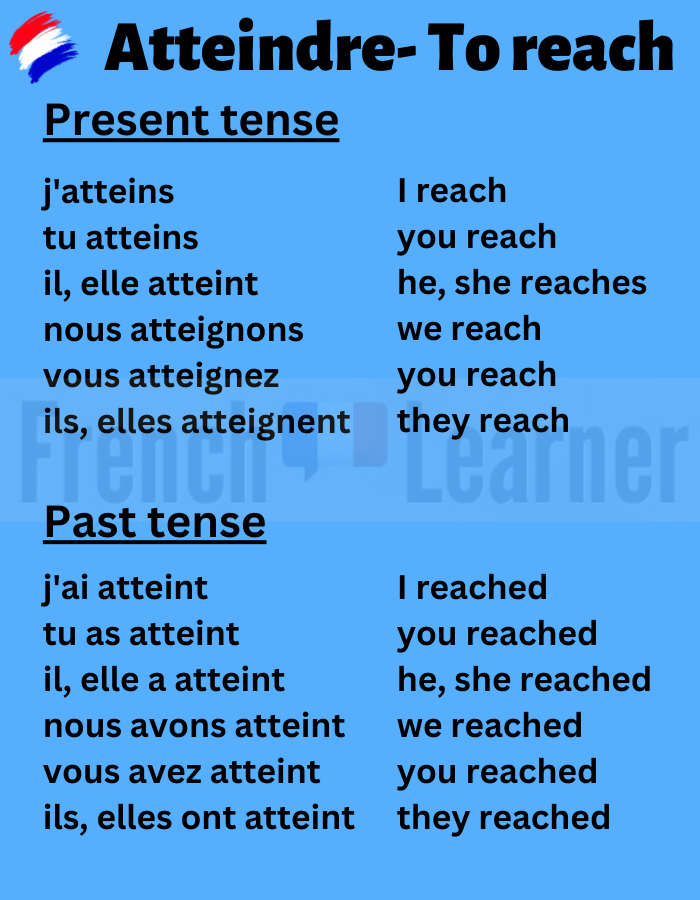When learning French you’ll be faced with the challenge of learning verbs. In general, there are two kinds of verbs: regular and irregular. Regular verbs follow set patterns for their conjugations. Irregular verbs, however, follow nonuniform conjugation patterns. This page explores French irregular verbs in detail.

Most Common French irregular verbs
The most common French irregular verbs are:
- Être (to be)
- Avoir (to have)
- Faire (to make, to do)
- Aller (to go)
- Devoir (must, to have to)
- Savoir (to know)
- Connaître (know)
- Dire (to say)
- Boire (to drink)
- Dormir (to sleep)
- Couvrir (to cover)
- Courir (to run)
- Écrire (to write)
- Mettre (to put)
- Partir (to leave)
- Prendre (to take)
- Apprendre (to learn)
- Sentir (to feel)
- Sortir (to go out)
- Tenir (to hold)
- Venir (to come)
- Voir (to see)
- Pouvoir (can, to be able)
- Vouloir (to want)
- Atteindre (to reach)
What is an irregular verb?
A verb is classified as “irregular” when its endings when conjugated in the present tense are different than other regular verbs in that group.
There are three major groups of regular verbs in French: -er, -re and -ir. This page on our site covers French regular verbs in detail.
The verbs which we’ve included on this page are the irregular verbs found on the “Essential 55 verb list” in the book Barron’s 501 French Verbs.
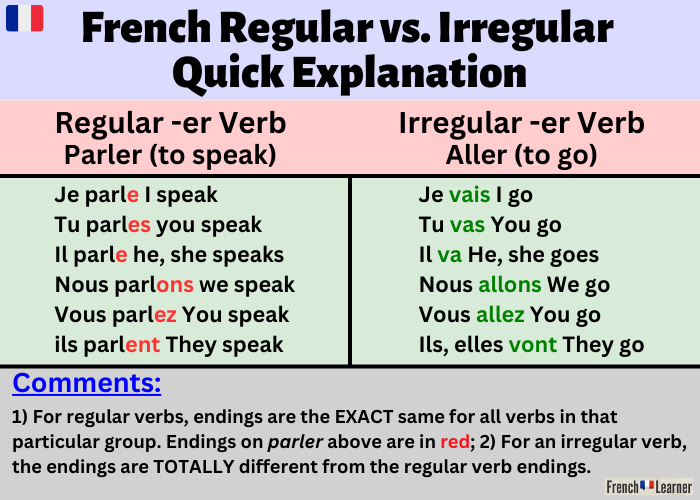
Notes for using this page
This page uses two ways of saying “you” in French: tu and vous. Tu is you in the singular and familiar form. Vous is you in the formal and plural form. This page on our site covers tu vs. vous in detail.
On the il, elle (he, she) lines in the conjugations below we’ve left out the personal pronoun on, which can mean “we” or “people” in general. The page on our site covers the personal pronoun on.
On this page we’ve included the passé composé as the past tense. French has several commonly used past tenses. The passé composé is used for past actions which occurred at specified times.
Another commonly used French past tense is the imparfait (imperfect). The French use the imperfect tense to express past actions which occurred at unspecified times. This page on our site covers the imperfect tense in detail.
The purpose of this page is to present the irregular verbs simply and comprehensively. For most verbs, we’ve included links to pages covering conjugation charts with more extensive verb tenses and example sentences.
French has a number of -er verbs with stem changes. For example, for -er verbs ending in -yer in the infinitive form, the -y becomes in -i in the present tense conjugation. The verbs payer (to pay) and essayer (to try) fall into this category. There are also verbs with accent changes.
1. Être – to be
Être means “to be” and is the single most commonly used verb in the French language.
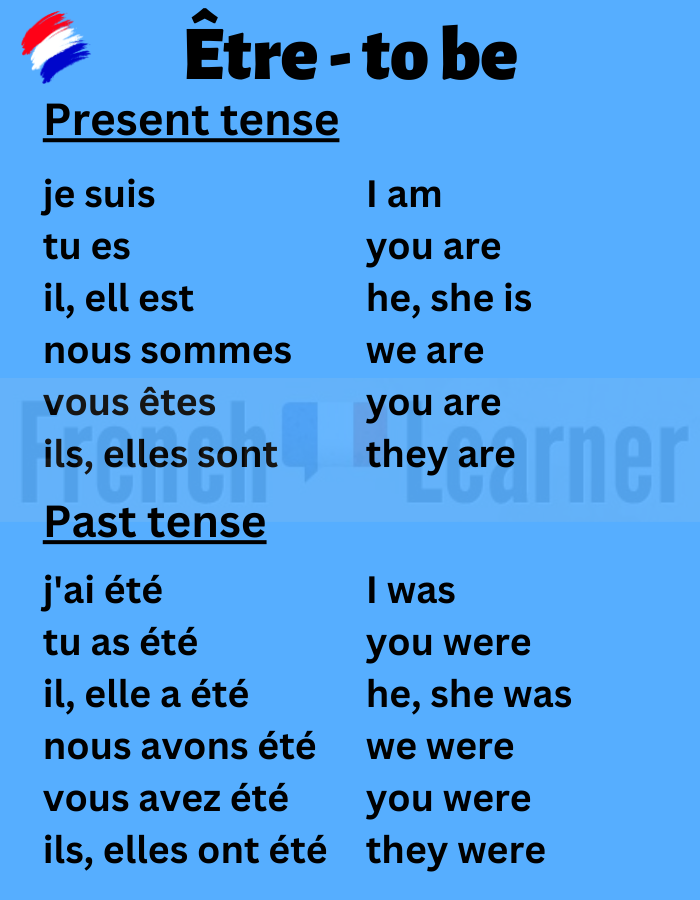
2. Avoir – to have
Avoir mean to have and is also one of the most commonly used French verbs.
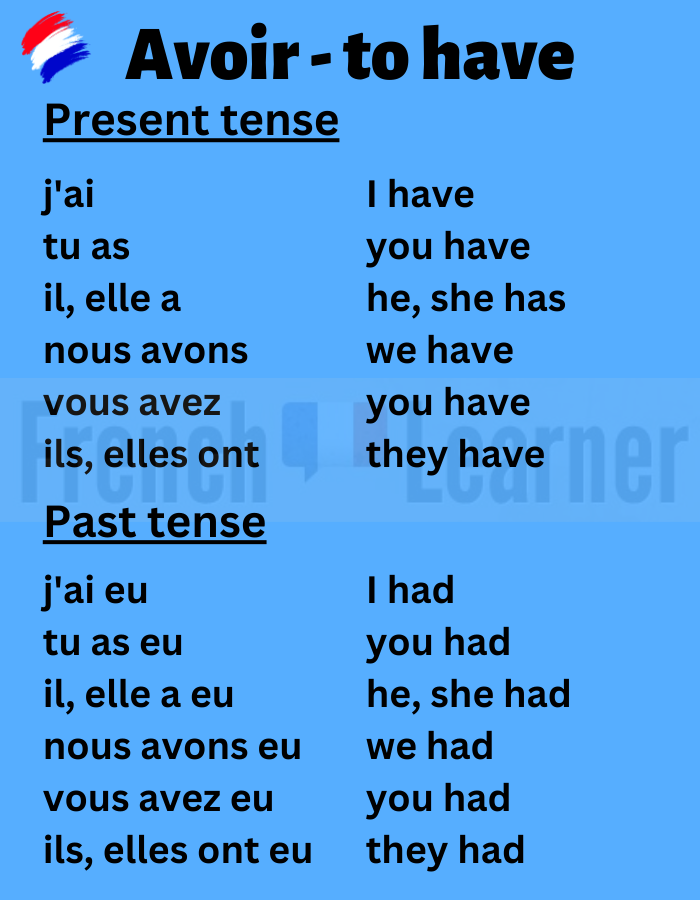
3. Faire – to make, to do
The verb faire translate to “to make” and “to do” and is used in a very wide variety of expressions.
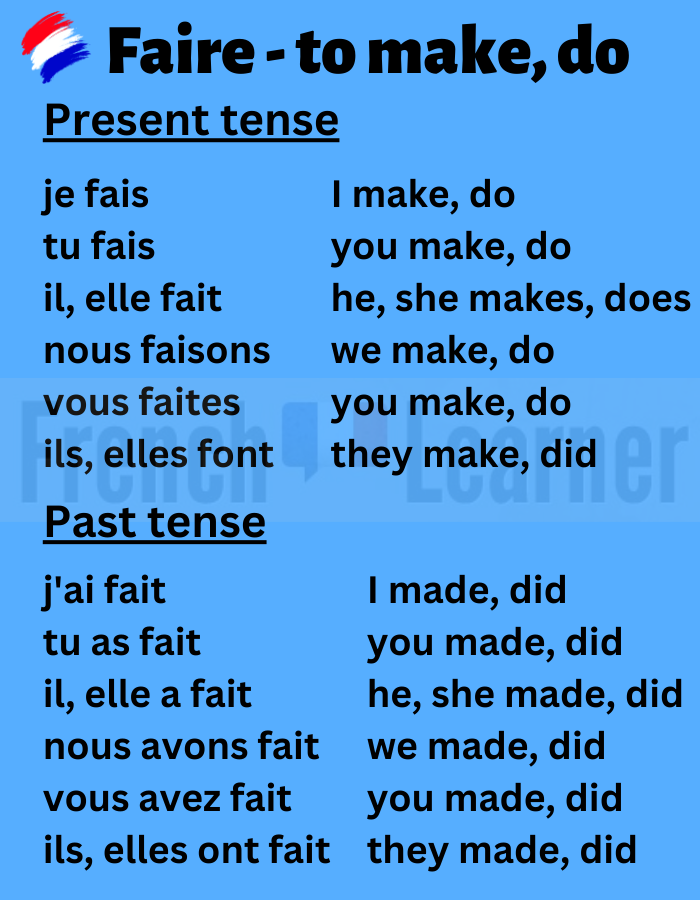
4. Aller – to go
The verb aller means “to go”. In the passé composé, aller uses the verb etre (to be) as an auxiliary verb.
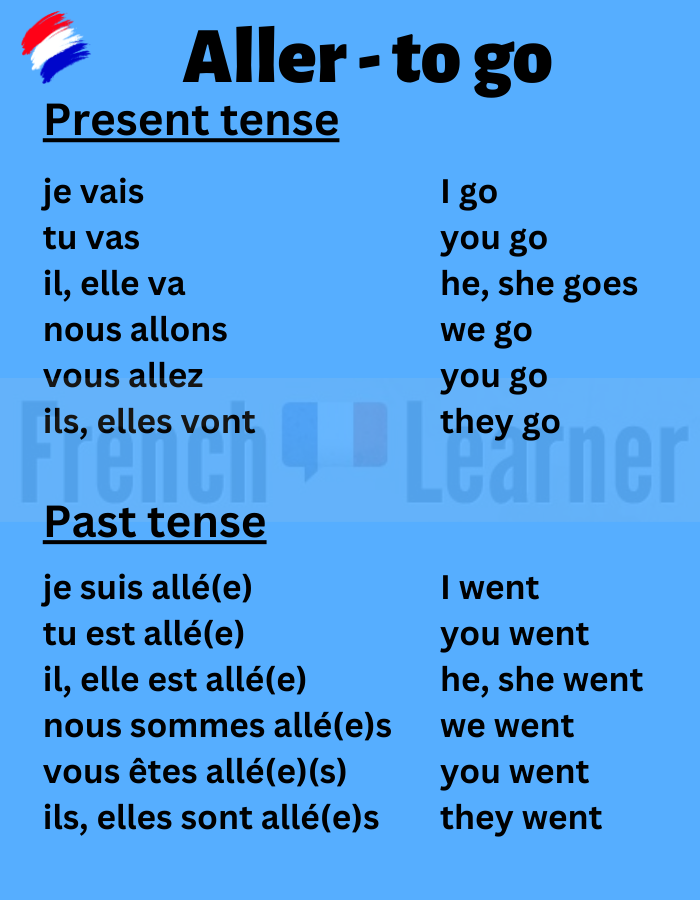
5. Devoir – must, to have to
The verb devoir translates to both “must” and “to have to”.
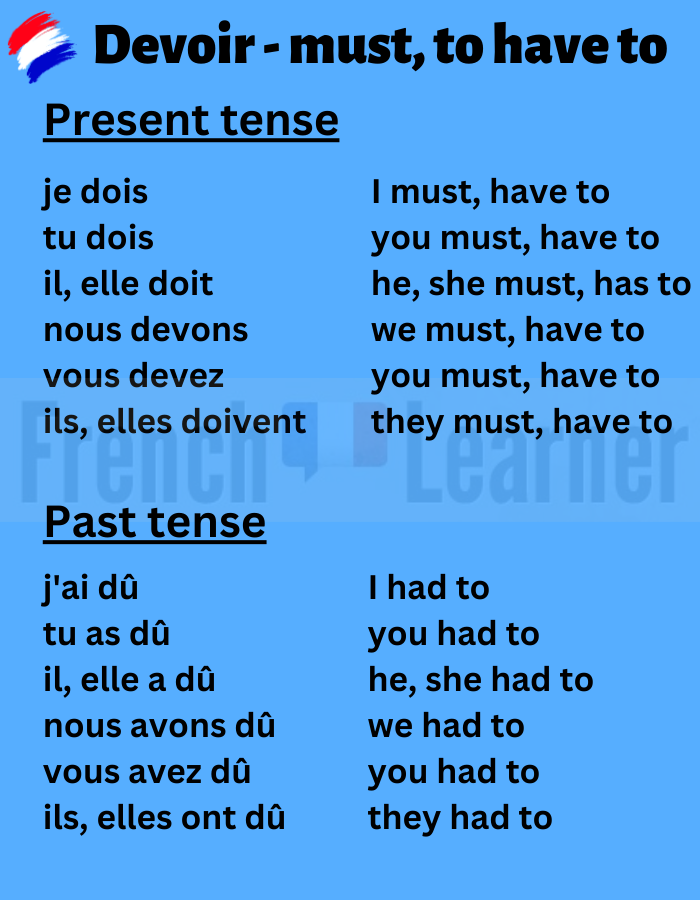
6. Savoir – to know
In French, savoir mean “to know” in the context of topics which are factually known.
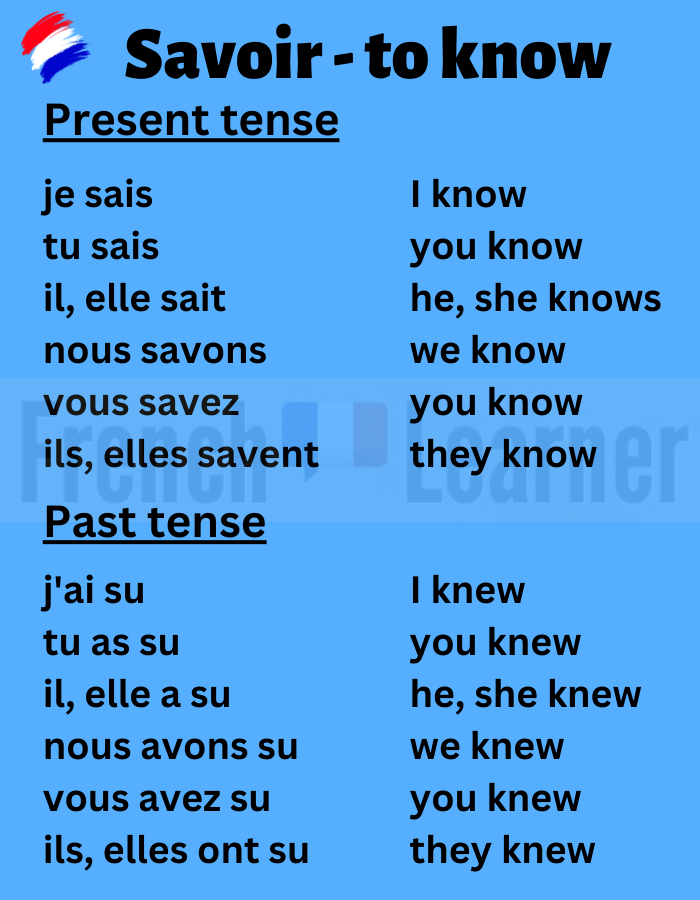
7. Connaître – to know
In French, connaître also means to know for people, places and areas of study. This page on our site explains the difference between savoir and connaître. The verbs reconnaître (to recognize) and paraître (to appear, to seem) and apparaître (to appear) follow similar conjugation patterns to connaître.
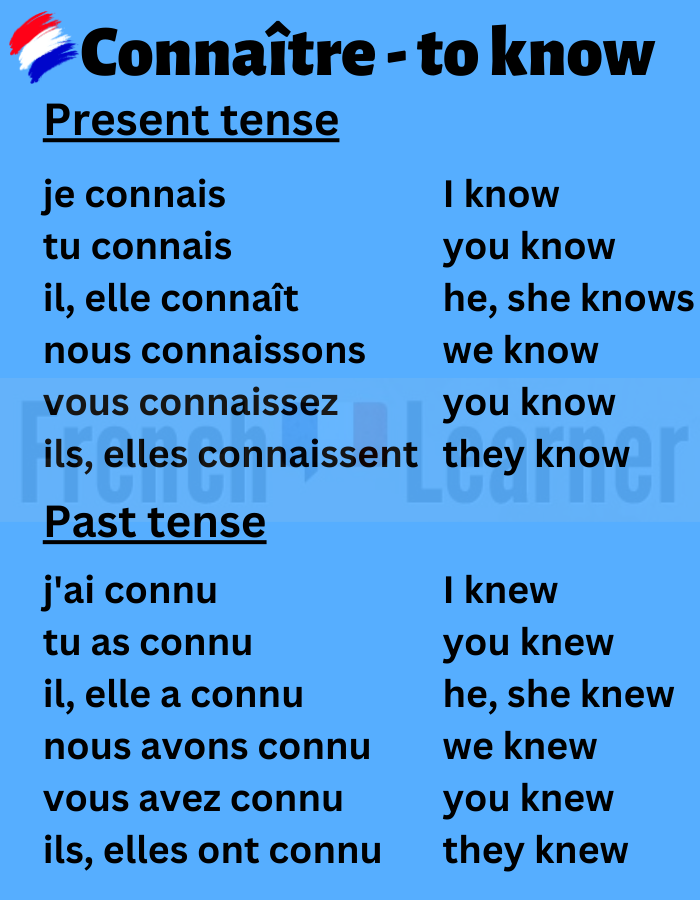
8. Dire – to say
The verb dire translates to “to say” and “to tell”. The vous form is highly irregular as it does not end in -ez.

9. Boire – to drink
Boire translates to “to drink”. The -oi in the noun and vous forms becomes -u.
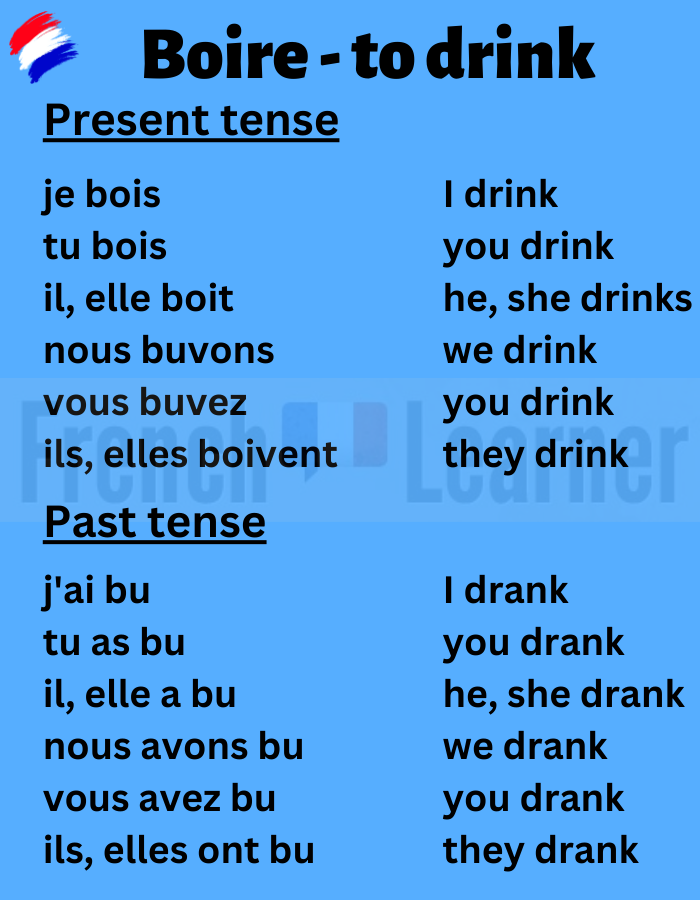
10. Dormir
Dormir means “to sleep’ and is an irregular -ir verb. It’s endings are -s, -s, -t, -ons, -ez and -ent.
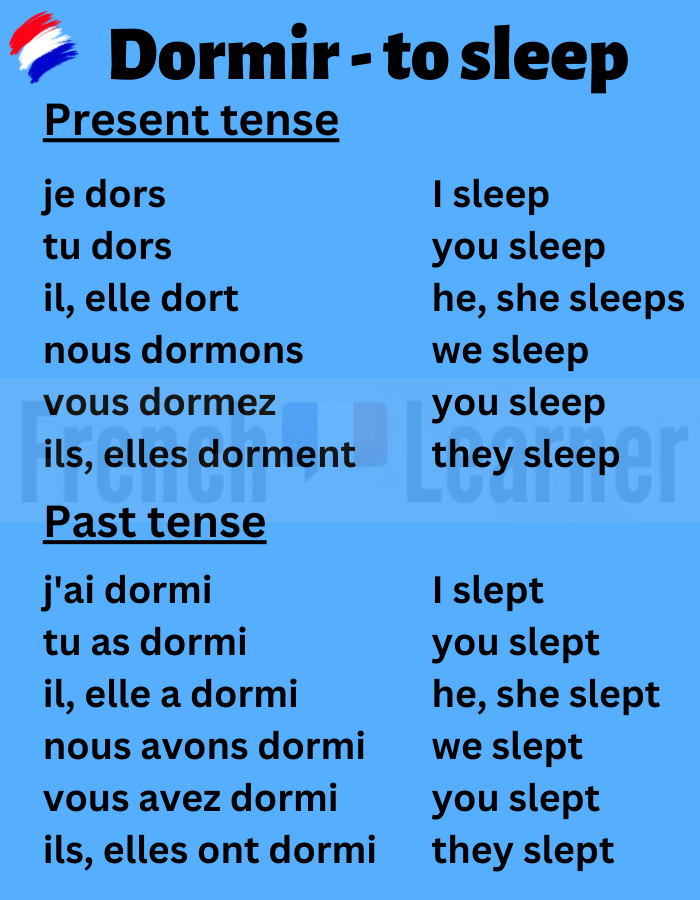
11. Couvrir – to cover
The verb couvrir is an irregular -ir verb and translates to “to cover”. It’s endings are the same as regular -er verbs: -e, -es, -e, -ons, -ez and -ent.
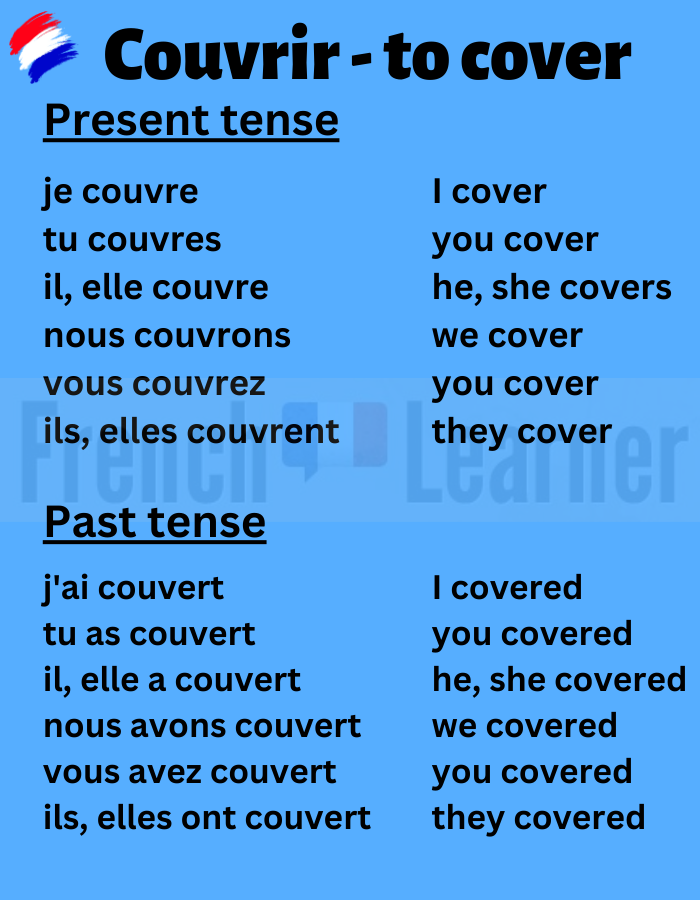
12. Courir – to run
The verb courir translates to “to run” and is an irregular -ir verb. It’s endings are -s, -s, -, -ons, -ez and -ent.
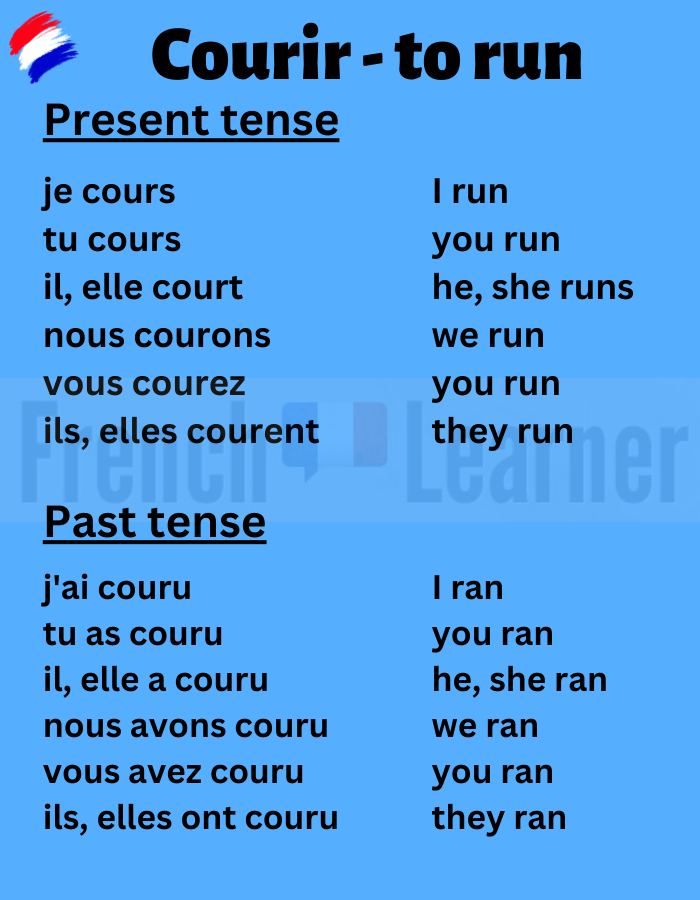
13. Écrire – to write
The verb ecrire means “to write” and is an irregular -ir verb. It’s endings are -s, -s, -t, -ons, -ez and -ent.
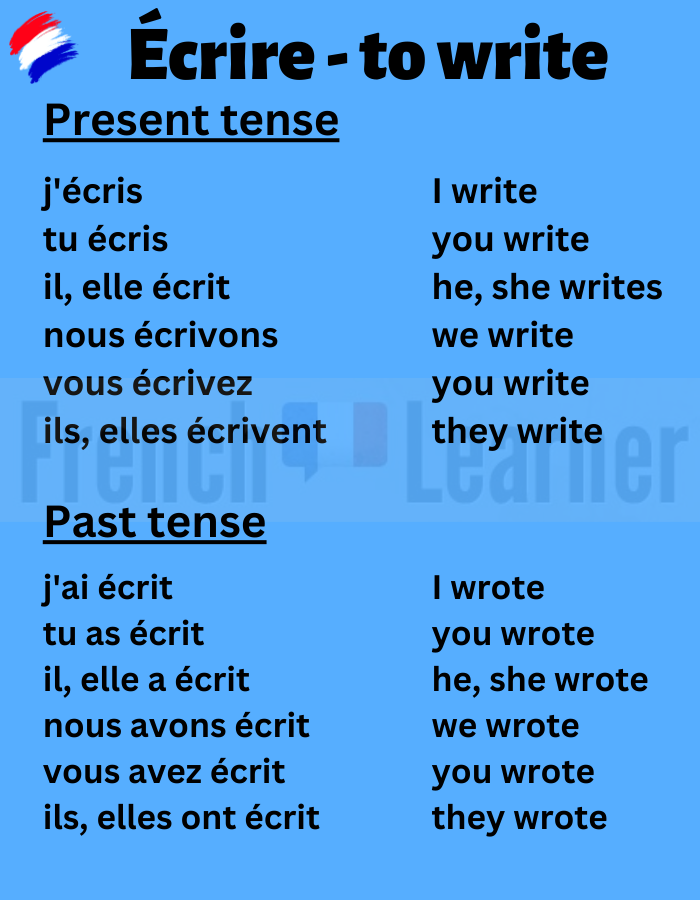
14. Mettre to put
Mettre means “to put” and is an irregular -re verb. It endings are -s, -s, -, -ons, -ez and -ent. The following verbs have conjugation patterns that are the same as mettre: promettre (to promise), permettre (to permit, to allow) and commetre (to commit).
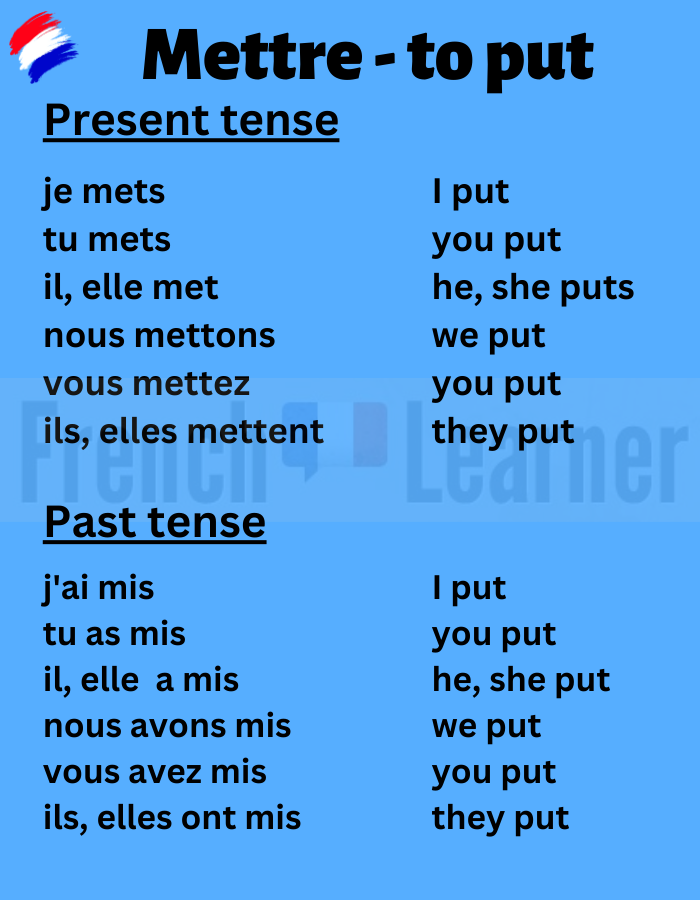
15. Partir – to leave
Partir means “to leave” and is a regular -ir verb. It’s endings are -s, -s, -, -ons, -ez and -ent.
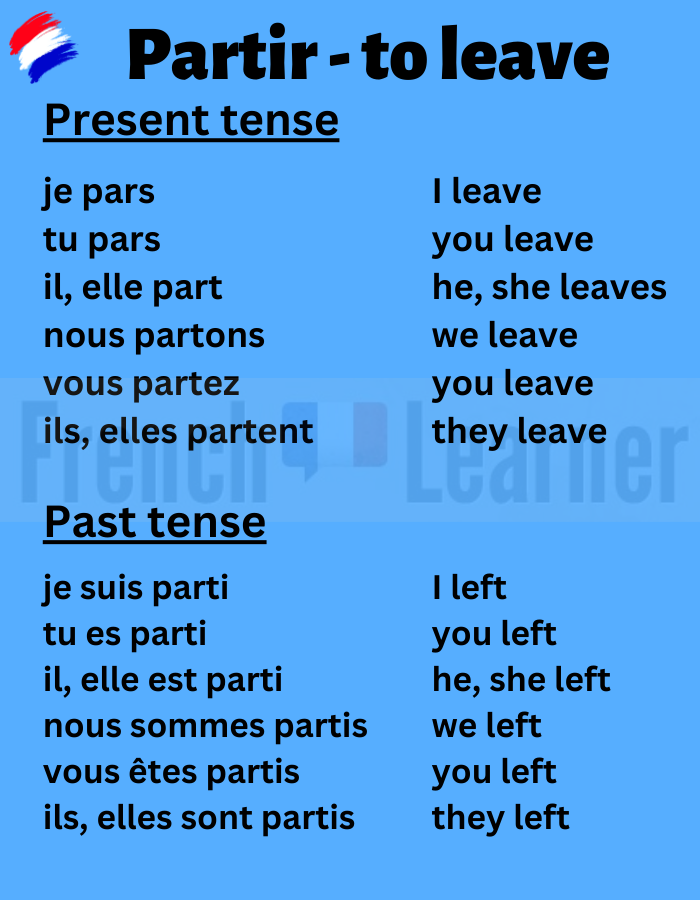
16. Prendre – to take
Prendre means “to take” and is a regular -re verb. Its endings are -s, -s, -, -ons, -ez and -ent. The -n doubles on the ils form. The verbs comprendre (to understand) and apprendre (to learn; see below) conjugate in the same manner as prendre.
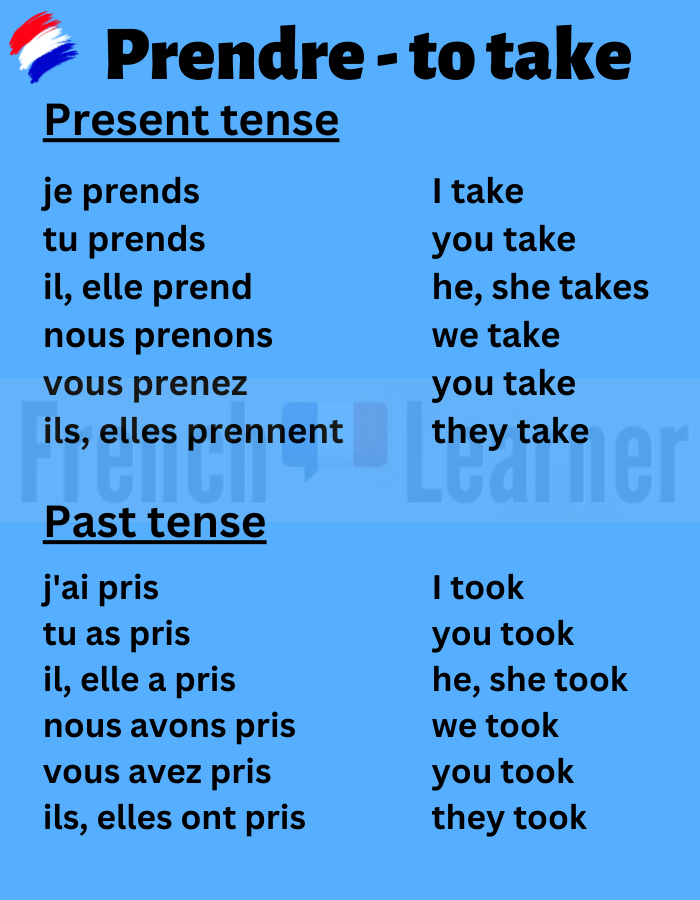
17. Apprendre – to learn
Apprendre means “to learn” and is a variant of prendre (see above) with the prefix -ap.
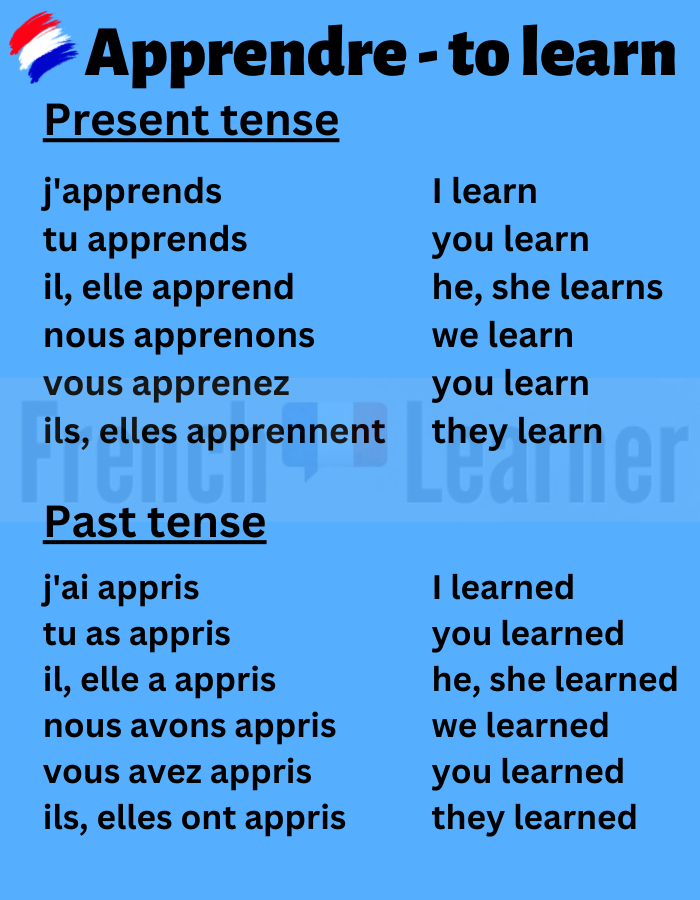
18. Sentir – to feel, to smell
Sentir is an irregular -ir verb and means both “to feel” and “to smell”. It’s endings are -s, -s, -t, -ons, -ez and -ent.

19. Sortir – to go out
Sortir is an irregular -ir verb and means “to go out”. Its ending are -s, -s, -t, -ons, -ez and -ent. Sortir uses être (to be) as an auxiliary verb in the passé composé.
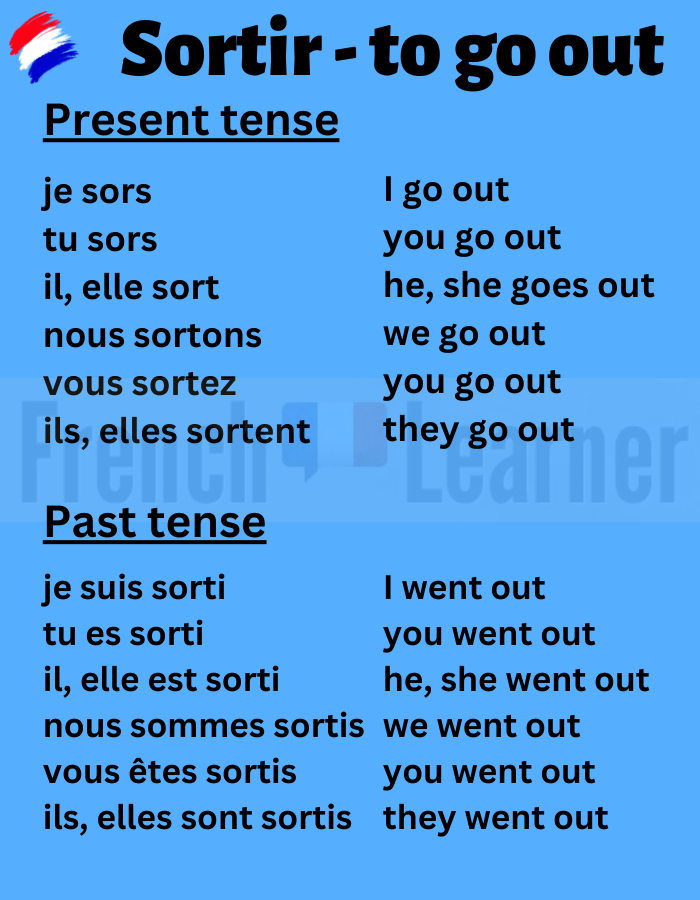
20. Tenir – to hold
Tenir is an irregular -ir verb and means “to hold”. Its conjugation is essentially the same as venir (to come; see below).
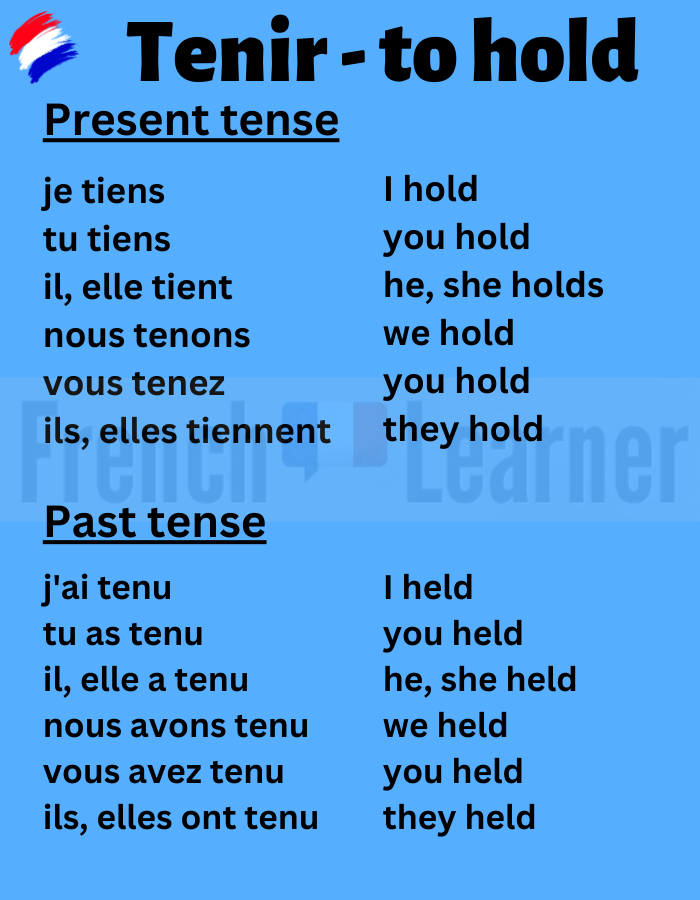
21. Venir – to come
Venir is an irregular -ir verb and means “to come”. It’s conjugated in the same manner as tenir (to hold; see above). Venir takes être as an auxiliary verb in the passé composé.
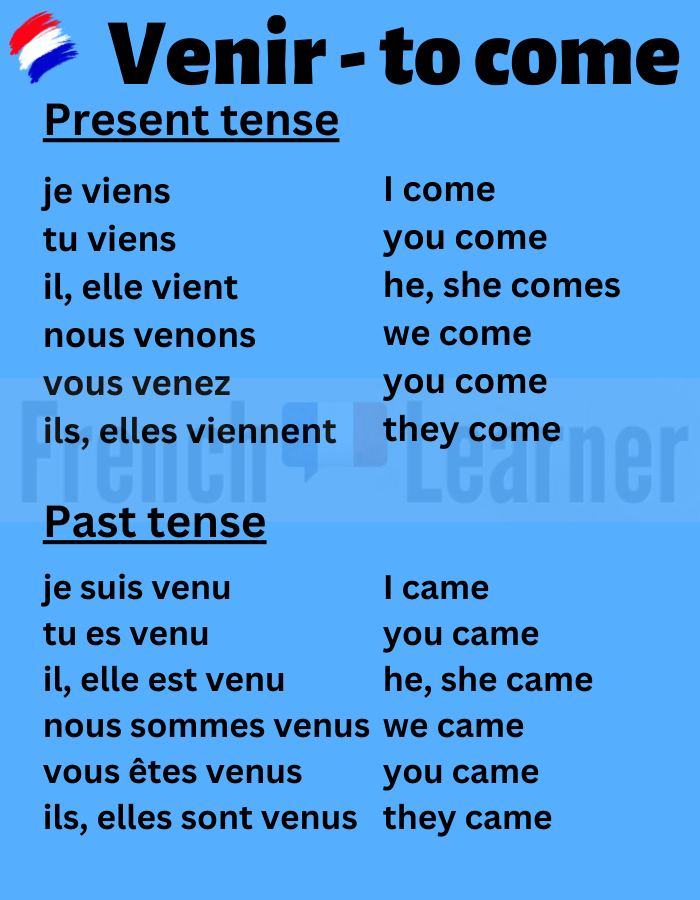
22. Voir – to see
Voir is an irregular -ir verb and means “to see”. The verb croire (to believe) conjugates in the same manner as voir.
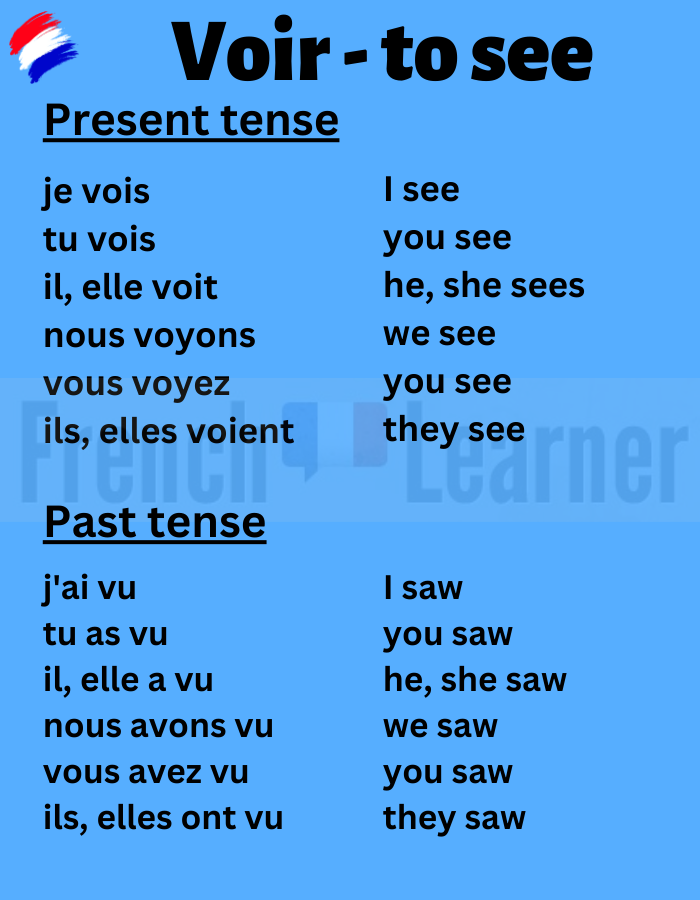
23. Pouvoir – can, to be able
The verb pouvoir translates to “can” and “to be able”. It’s conjugation is very similar to vouloir (to want; see below).
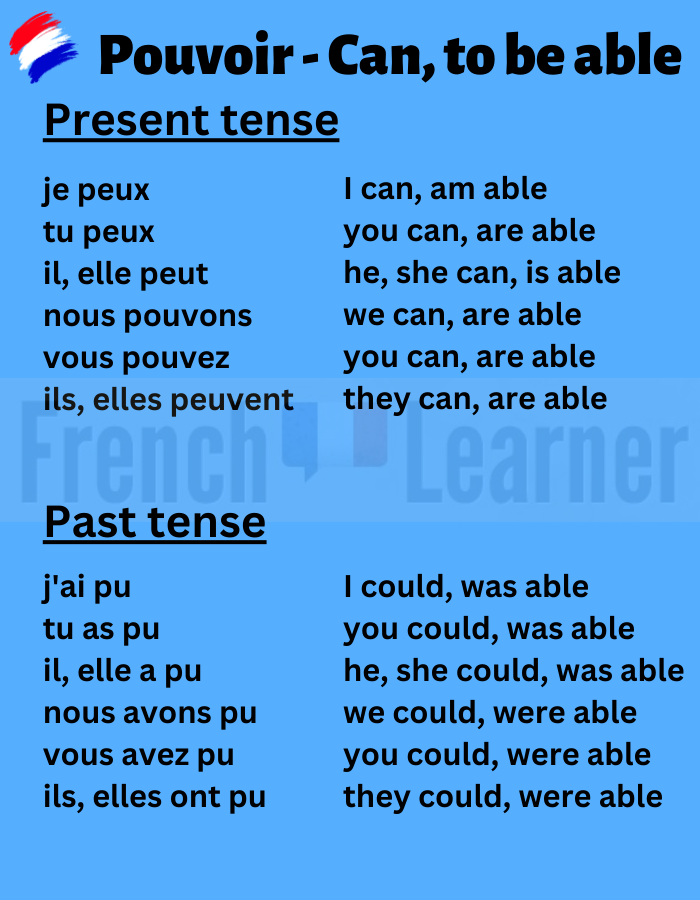
24. Vouloir – to want
Vouloir translates to “to want” and has a conjugation pattern that is similar to pouvoir (can, to be able; see above).
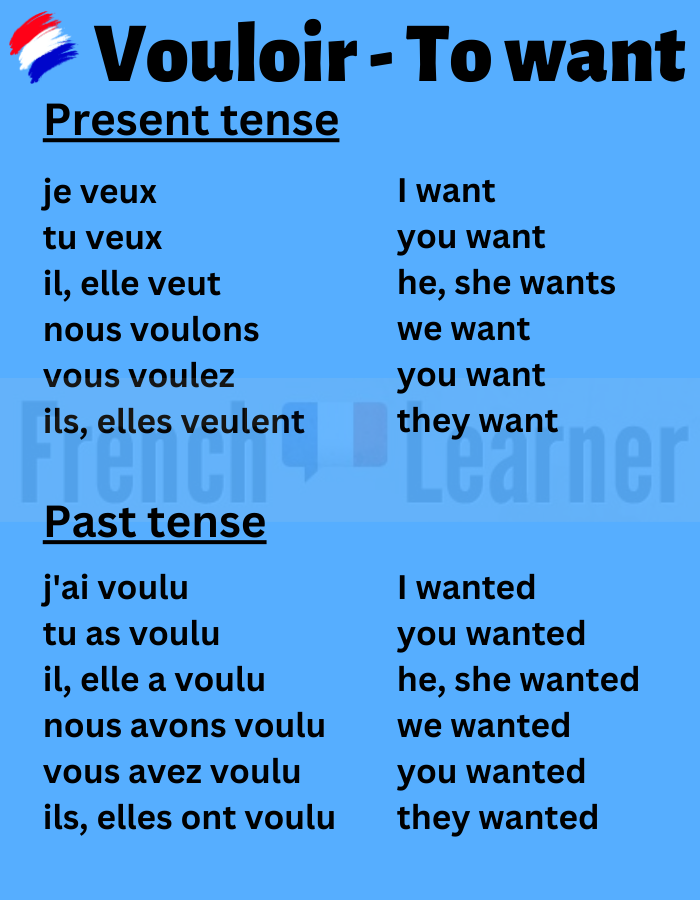
25. Atteindre – to reach
The verb atteindre means “to reach”, as in reaching a goal. Verbs ending in –aindre and –eindre in the infinitives have similar conjugation patterns. Such verbs also include peindre (to paint), plaindre (to pity), craindre (to fear) and feindre (to fake, to feign).
